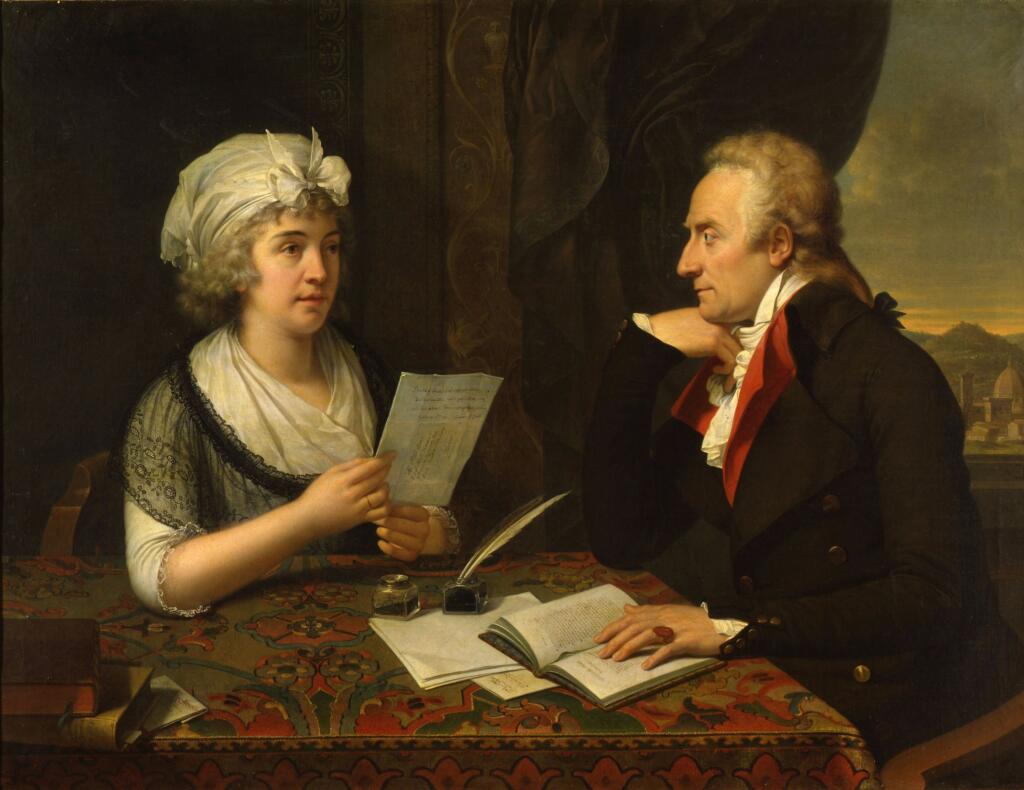
Vittorio Alfieri, di famiglia nobile, nasce ad Asti il 16 gennaio del 1749. Per avviarsi alla carriera militare si iscrive alla Reale Accademia di Torino che lascia nel 1766 con il grado di alfiere. In seguito, inizia a viaggiare per l’Europa. Di ritorno in Italia, dopo un breve soggiorno a Roma, decide di seguire, in Francia, Luisa Stolberg, contessa d’Albany. Contrariato dal clima rivoluzionario francese fa ritorno in Italia e si stabilisce a Firenze, dove muore nel 1803. Vittorio Alfieri è uno dei più famosi poeti tragici del Settecento. Una vita divisa tra viaggi, avventure amorose e continue lotte verso le ideologie tiranniche fanno del letterato uno dei precursori delle inquietudini che distinguevano gli animi del Romanticismo.
Definito da Vincenzo Monti “fabbro d’incolti / ispidi carmi”, a cui gli fa eco Giuseppe Parini che in un sonetto si domanda perché “dell’estro ai generosi passi/ fan ceppo i carmi?” Ad affossare completamente Vittorio Alfieri ci pensa August W. Schlegel appellandolo, senza panegirici, “autore impoetico, pessimo nella versificazione”. Insomma non si può dire che è stato granché acclamato dai suoi colleghi. Per diverso tempo le tragedie e lo stile di Alfieri sono rimaste indigeste alla critica, d’altro canto come dare torto agli amici e rivali contemporanei e non? Ė stata cosa ardua far venire alla luce del sole il genio poetico celato nei versi asciutti e disarmonici.

Curiosità sulla vita del poeta: infanzia e adolescenza
Da dove origina il carattere appassionato e irrequieto al contempo? Senza scomodare Freud, come ognuno di noi, anche Vittorio Alfieri è stato bambino e adolescente, ma in che contesto familiare ha sviluppato la sua personalità? Abbastanza discutibili e bizzarri i metodi educativi adottati dagli adulti di riferimento, si racconta che una delle punizioni a cui veniva sottoposto il piccolo Vittorio era quella di doversi recare a messa con una retina sulla testa ogni qualvolta ne combinava una delle sue, più che espiare l’imprudenza commessa veniva sottoposto alla pubblica gogna. Non c’è da stupirsi che avesse sviluppato un “umor malinconico” come lui stesso ha scritto nella sua opera “Vita”, un’afflizione tale da indurlo all’età di sette anni a un tentativo di suicidio. Scioccamente pensò di imitare il sapiente Socrate, anche se verosimilmente nella sua zucca la conoscenza del filosofo non aveva ancora fatto ingresso. Un mattino si alzò con l’intento di abbuffarsi di cicuta o perlomeno quella che lui riteneva fosse tale, fu fortunato il giovincello, nell’orto dove si era recato crescevano soltanto erbaggi innocui la cui ingestione procurò all’inesperto fanciullo banali sintomi intestinali.
Vittorio Alfieri è noto anche per il suo motto “Volli, e volli sempre, e fortissimamente volli”, divergenti le teorie che provano a dare una spiegazione plausibile all’aforisma, secondo alcuni l’Alfieri l’avrebbe scritto per testimoniare la decisione di farsi incatenare alla sedia dal suo servo per imporsi di scrivere e diventare un autore di tragedie, secondo altri il motto cela la lotta interiore del poeta per reprimere un sentimento profondo provato per una donna.
Le opere: Le Rime
Le Rime è un’opera costituita da circa trecento componimenti, è una sorta di diario poetico scritto durante tutto l’arco della vita, come forma prevale il sonetto di ispirazione petrarchesca, presenti, però, anche epigrammi, canzoni e odi. Il libro costituisce una valida testimonianza del pensiero e dello stato d’animo del poeta, d’impronta autobiografica, giacché, tutte le rime riportano a piè di pagina indicazioni relative a data, luogo e situazioni in cui sono state composte. Diverse le tematiche affrontate nell’opera: il sentimento della solitudine, l’amore per la contessa d’Albany, il contrasto ragione/sentimento, il dolore poetico e la riflessione sull’essere poeta, la passione per la politica. Un concentrato di vita espresso attraverso uno stile dal ritmo ripetutamente interrotto, frasi spezzate in modo secco e breve, accostamenti spesso dissonanti, un linguaggio non granché armonioso e musicale. Tutto questo, però, fa di Vittorio Alfieri il poeta che ha saputo dare una raffigurazione tragica dei sentimenti.
